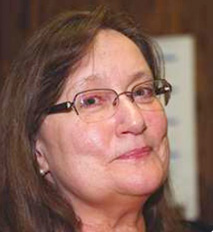
Obituary: Margot Imdieke Cross, Minnesota disability rights advocate, worked ‘to make the world a better place’
Disability rights advocate Margot Imdieke Cross blazed so many trails when it comes to access in Minnesota that people she worked with say there aren’t many trails left to blaze.
“She did it so well that a lot of the work she did, we don’t need to keep doing because it’s already locked in and done,” said David Dively, executive director of the Minnesota Council on Disability.
Cross, who worked for more than 35 years with the Minnesota Council on Disability, an independent state agency that focuses on advocacy and training on disability rights and policy, died July 21 at the M Health Fairview University of Minnesota Medical Center in Minneapolis from complications related to uterine cancer. She was 68.
Disability rights advocate Margot Imdieke Cross, 68, of Minneapolis, died July 21, 2024, from complications related to uterine cancer at the M Health Fairview University of Minnesota Medical Center in Minneapolis. (Courtesy of Stuart Cross)
Cross was instrumental in making sure that every major sports facility in Minnesota, including Target Field, U.S. Bank Stadium, CHS Field and Allianz Field, is accessible to all, Dively said. In fact, Target Field was considered “a leading stadium for accessibility” when it opened in 2010, he said. “That was Margot’s advocacy.”
Cross helped get legislation passed that advanced a range of disability rights; conducted countless presentations; consulted with architects, designers, contractors and builders; gave voice to community concerns, and contested the status quo, he said.
As new building projects or stadiums were funded in Minnesota, Cross was the main person from MCD “ensuring that access was a part of that,” Dively said. “Margot had two different kinds of roles: one was on the policy side, dealing with building code. She had a large role in requiring that building code required access — that was the proactive and system change part of it. Margot then also would work on the implementation side — working on these actual cases to ensure that there was follow through.”
She also consulted on the new Minnesota Senate Building, State Capitol Complex renovations, Green Line and Blue Line light-rail projects, Target Center renovations, and worked to ensure accessibility in state parks and trails. She also was an advocate for disability parking spots, accessible polls and curb cuts, he said.
“It’s just an unimaginable loss for Minnesota and the nation,” said Jane McClure, editor of Access Press. “She did so much with access — I don’t know if anyone will have that level of influence again.”
Cross was present in 1990 when President George H.W. Bush signed the landmark Americans with Disabilities Act into law.
“She often talked about that and how meaningful that was, but she also felt that the promises of the ADA weren’t being met, especially in terms of employment,” McClure said. “She talked about getting turned down outright for a job as a telemarketer because she was in a wheelchair.”
Cross was part of a “dwindling population of people who remember what life was like before the ADA,” McClure said. “She would talk about getting out of wheelchair and ‘rumping it’ — scooting on her rear — to get on a city bus and then ask someone to pull her chair up. She would have to wheel down to an alley to get across the street because there were no curb cuts. How do you replace somebody like that? You don’t. She had absolutely encyclopedic knowledge about disability and access and what works and what doesn’t work in terms of access.”
Margot Imdieke grew up on a farm near Sauk Centre, Minn. She was paralyzed from the waist down when she was struck by a truck when she was 1. Her father, Otto Imdieke, died in a farm accident when she was 4.
Cross always credited her brothers — Tim, Dan, David and Herman — “with making sure she grew up independent,” said Stuart Cross, her husband. “They had her do everything for herself.”
Cross graduated from Sauk Centre High School in 1974 and attended the University of Minnesota. While at the U, she became active in the disability rights movement, he said.
The couple met at a Halloween party in 1994.
“We were smitten with each other right from the beginning,” he said. “We talked all night — politics, sports, religion, the environment. We talked about everything, and we both decided we liked each other.”
The couple married in 1996 at their home in Minneapolis.
Related Articles
Amid bumper crop of wild mushrooms, Midwest sees surge in calls to poison control centers
‘Keeping baby bottoms covered’: Diaper Bank of Minnesota grows to meet family needs
Q&A: Suzanne Kelly, new CEO of Minnesota Council of Churches, wants to build a faith community ‘that makes people feel whole’
Jim Scheibel: We need staffing requirements for nursing homes. Don’t block the way, Congress
Letters: We need another presidential debate. Here’s how it should work
Margot Cross served on the boards for Wilderness Inquiry, Access Press and Metropolitan Center for Independent Living. She also was a Minneapolis civil rights commissioner and was a member of the Minneapolis Advisory Committee on People with Disabilities.
In 2003, Cross was the first recipient of the Access Press Charlie Smith Award for her dedication to improving the lives of people with disabilities. She also received the Courage Center’s Rose and Jay Phillips Award.
“Her whole life was a defining moment — the challenges that she met and overcame,” Cross said. “She had a big heart, and she was compassionate and tough at the same time. She just wanted to make the world a better place. She really deeply, in her heart of hearts, cared about people.”
In addition to her husband, Cross is survived by her four brothers and three sisters. She was preceded in death by her parents and a brother.
A celebration of Cross’ life will be held at 10 a.m. Aug. 7 at Banquets of Minnesota in Fridley. Lunch will be served after the service, and story and fellowship time will continue until 3 p.m. ASL and CART will be provided for the service, lunch and story time.
Crescent Tide Cremation Services is handling arrangements.
Related Articles
Amid bumper crop of wild mushrooms, Midwest sees surge in calls to poison control centers
‘Keeping baby bottoms covered’: Diaper Bank of Minnesota grows to meet family needs
Q&A: Suzanne Kelly, new CEO of Minnesota Council of Churches, wants to build a faith community ‘that makes people feel whole’
Jim Scheibel: We need staffing requirements for nursing homes. Don’t block the way, Congress
Letters: We need another presidential debate. Here’s how it should work

